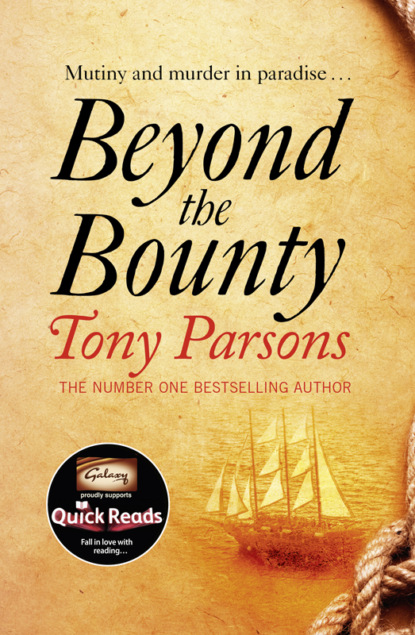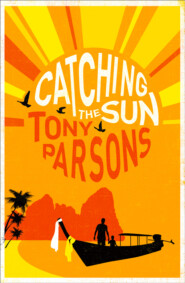По всем вопросам обращайтесь на: info@litportal.ru
(©) 2003-2024.
✖
Beyond the Bounty
Автор
Год написания книги
2018
Настройки чтения
Размер шрифта
Высота строк
Поля
Mister Fletcher Christian.
That’s always what he was to me – Mister Fletcher bloody Christian.
From the first moment I saw him, looking dapper in his fine midshipman’s clothes on the deck of HMS Bounty as we set sail on 23rd December 1787 from Spithead, to the last moment I saw him dying of those terrible burns more than two years later on the beach of Pitcairn.
I never cared for the fellow.
Oh, I know the ladies in smart drawing rooms back in London probably still get all weepy when they think of Mister Fletcher Christian – so tall, so handsome, so doomed. And I knew men who would have followed Fletcher Christian to the gates of hell and beyond.
But he was not for me.
I knew him. Not the legend but the man. I saw his kindness and his courage when he faced down our first captain, William Bligh.
I knew Fletcher Christian and I choked on the smell of his burning flesh as he died in my embrace. And I could see clear enough what the rest of the world saw in him too.
He was blue-eyed and fair-haired, broad-shouldered and topping six foot. Clean of mind – at least until he fixed his telescope on those Tahitian maids – and clean of limb. Brave as a young lion.
He stood up to Bligh’s foul cruelty when it would have been the easy thing to go below deck and puff his pipe and read his Bible. Instead Fletcher Christian led us, and he steered the Bounty and the mutineers into history.
Even at the moment of his death, Fletcher’s heart was made of the same sturdy English oak as our ship. But I believe that we broke his heart when we torched the Bounty as she lay in the bay.
We burned her to avoid detection. We burned her to prevent desertion.
And most of all we burned her to avoid Fletcher Christian having the bright idea of going home to dear old England to explain our actions to some judge who would hang us all.
For that was what he wanted – our leader, our young lion, our Mister Fletcher Christian – he wanted to explain our mutiny to those in England.
The rest of us were willing to settle for watching fifty years of sunsets with some Tahitian maid under a palm tree. And keeping the hangman’s rope from our mutinous necks.
But he was good, you see.
Mister Fletcher Christian. A good man. An honest man. They all loved that goodness in Fletcher Christian, even as he burned to a crisp under the tropical moon.
The men. The women. The world. But what they loved about Mister Fletcher Christian was what made me, in some secret chamber of my heart, turn away from the man.
For it was the very goodness of Mister Fletcher Christian that stuck in my throat. He carried his goodness around like a bloody halo, expecting the rest of the world to give it a polish every now and then. He carried his goodness like Christ with his cross on the road to Calvary.
And our captain was crucified upon that cross.
Mr Christian – was ever a legend more fittingly named? – thought he was better than other men.
More moral. More noble. More good.
Perhaps he was right. Perhaps.
He certainly always thought it. He had the rock-solid confidence of the upper-class Englishman.
A bit of a snob, our Mister Christian.
He may have believed that our first cruel captain, Bligh, was wicked and evil and a monster. It is true that Bligh would smile at the sight of the whip being brought out as if it was the sun breaking through grey clouds, or an orange in a stocking on Christmas Day.
But I reckon that Fletcher Christian also believed that William Bligh was from the gutter.
I reckon that Mr Christian thought that rough William Bligh was little better than the scum and rascals who made up the crew of the Bounty on our mad mission to bring back breadfruit from the South Seas of the Pacific Ocean.
Fletcher Christian looked down on William Bligh. And he would have looked down on Bligh even if he had spoon-fed us rum from dawn to dusk.
Still, Fletcher Christian was impressive. I will give him that.
They are building their bloody Empire on the likes of Fletcher Christian. They think that men like him (the brightest, the best) are leading the likes of me (the rankest, the worst).
Fletcher sipped his port. The men got roaring drunk on rot-gut rum. Fletcher fluttered his eyelashes at the ladies. We whored. Fletcher was a cultivated man. We could just about make our mark if you were to guide our hand. You get the picture.
Fletcher Christian was a gentleman.
More than us. And more than Bligh. But better than the rest of us? Mister Fletcher Christian clearly thought so.
But in my experience of this wicked world, all men are much the same.
The Bounty burned all night.
As the sun came up over the South Seas, the ship that had carried us so far was meeting its end in flames fifty feet high.
It was a day as close to Paradise as I ever saw in this world. The sky above the island was so blue that it made your heart ache to behold such beauty.
A soft breeze was moving through the palm trees like a mother’s sigh. And the heat – it was that soothing heat that we found on the island, that calming heat we found at the end of the world.
Even as I held my dying captain in his final minutes, I was not sorry that we had burned the Bounty. Because we wanted this Eden to last.
We did not want to go back to England. There, we would have to tell our story and to make our case. To throw ourselves at the dubious mercy of some bewigged bastard of a judge.
After much careful reflection, we had no wish to sail back to England and face justice that would have had us all dangling on the end of a rope. We would hang – twitching and shitting and eyes bulging, our tongues turning black as our dear old mothers wept and the crowd roared with delighted laughter.
Go back to that?
No thank you, Mister Christian, sir.
But his goodness was calling him back to England. And then his goodness called him to that burning ship. And finally his goodness was calling him to Heaven.
‘Ned, I am done for,’ he croaked. ‘Tonight I shall walk the streets of glory, and sit with angels in the realm of the Lord.’
You could see he was quite looking forward to it. The angels. The clouds. The business of comparing halos. The way he told it, dying was like shore leave that lasted for all eternity. Without the pox and the sore heads. You could see the attraction.
Then he writhed and twisted with that terrible pain. Fire is a terrible way to go. Give me water. Give me my lungs full of salt water in Davey Jones’ locker for a year rather one minute of the pain that Mister Fletcher Christian endured at the end of his short and famous life.
The men were crying. The women too. The men were crying like women and the women were crying like banshees. What a racket! I had to bark at them to shut their traps. For I could hardly hear the words of the dying man in my arms.
‘Ned,’ he said. ‘Oh, Ned Young. Why did you do it? Oh, how could you burn our proud Bounty?’











